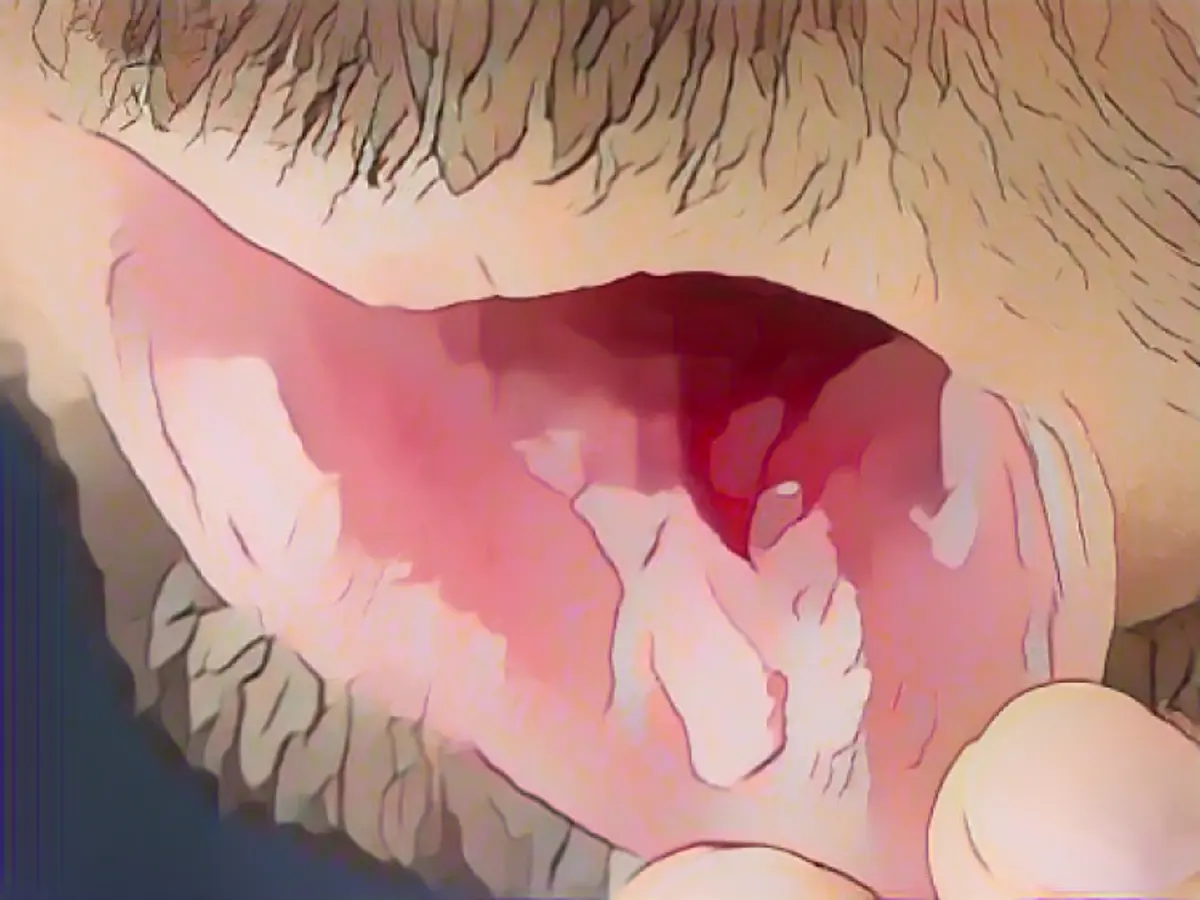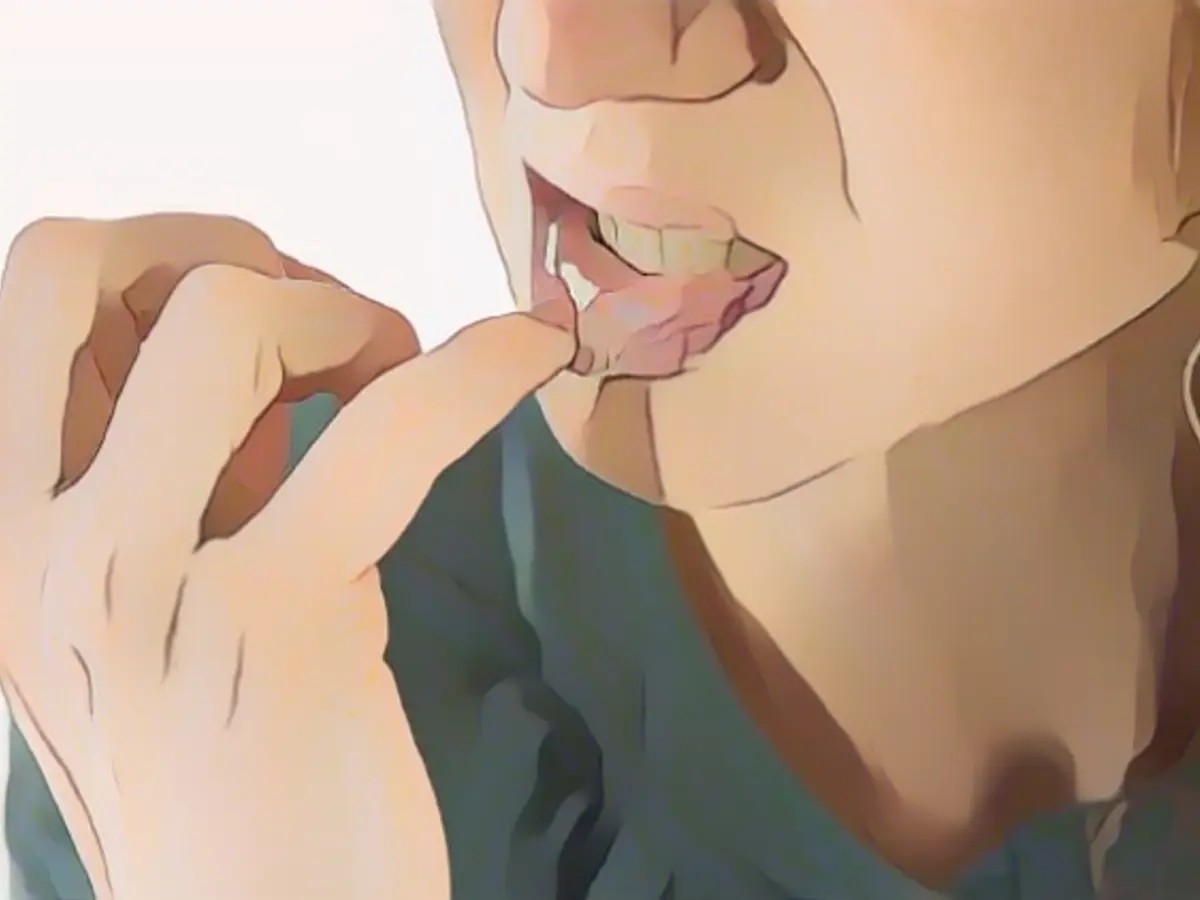What are aphthae - and are they dangerous?
If it burns and hurts in the mouth, aphthae may be the cause. What is the cause of the inflamed areas, are they a cause for concern - and what can be done to make them disappear again quickly?
Reddish inflamed areas in the mouth with a whitish coating: these are aphthae. They can form on the inside of the cheeks or lips, on the palate or on the gums. The tongue is also often affected.
Aphthae are usually harmless. But they can burn and hurt. When eating, drinking, speaking or brushing your teeth, it is difficult to ignore the fact that they are there.
Small or large aphthae

Nevertheless: "Aphthae usually heal on their own within seven to ten days," says Christoph Benz, President of the German Dental Association. This is usually the case with small aphthae, so-called minor aphthae. They have a diameter of two to three millimetres, rarely up to ten millimetres. Once they have healed, they leave no scars.
The situation is different with the larger major aphthae. They can grow up to three centimetres in size and are very painful. They take several weeks to heal - and often leave scars. There are also herpes-like aphthae, but these are rather rare. Here, up to 100 aphthae the size of a pinhead appear in the entire oral cavity. They heal again after seven to ten days.
What causes aphthae to form in the mouth?
According to Benz, the exact causes of aphthae have not yet been conclusively clarified scientifically. "It is being discussed that injuries to the oral mucosa caused by the toothbrush or a vitamin deficiency could trigger aphthae," says the dentist. Possible causes could also be allergic reactions or stress.
According to Ursula Sellerberg from the German Federal Chamber of Pharmacists, aphthae are often facilitated by pressure points from dentures or braces - or by the sharp edges of dental fillings.
Incidentally, women are more frequently affected by aphthae than men. Aphthae occur less frequently in older people than in younger people. "The reasons for this are also still unclear," says Benz.
I have an aphthous ulcer. What can I do?
If you notice aphthae in your mouth, you can first try to get the inflammation under control with a mouthwash - for example, one containing high doses of chamomile extracts. According to Ursula Sellerberg, mouthwashes with alcoholic chamomile extracts or an infusion of chamomile flowers (10 grams of chamomile flowers to 100 milliliters of water) have an anti-inflammatory effect.
However, they hardly reduce acute symptoms such as burning or pain. And: "Normal chamomile tea is too low in dosage and will have little effect," says Sellerberg. There are also various preparations available in pharmacies that can counteract the burning and pain: Gels, pastes, ointments, mouth sprays or lozenges, for example.
A tip from the pharmacist: Before applying gels, pastes or ointments, dab the sore dry with a cotton bud. "This prolongs the time the active ingredient remains on the mucous membrane," explains Sellerberg. Preparations that promise pain relief are best taken before meals so that the pain is bearable while chewing.
All other preparations are best used after eating and brushing your teeth. "If possible, nothing should be drunk for the first 30 minutes afterwards," says Sellerberg. Otherwise the preparation is washed away and cannot work properly.
If the symptoms are severe, a cortisone preparation can have a soothing effect. Before those affected use it for the first time, they should speak to a doctor.
When should you go to the doctor with an aphthea?
If there is no improvement after 14 days of self-medication, it is time to go to the dentist. Anyone who has to deal with aphthae more than three times a year should also visit the doctor's surgery. The family doctor, dermatologist or ENT specialist are additional points of contact if aphthae occur not only in the mouth but also in other parts of the body - because this also happens. Or if other symptoms are added: Fever, swollen lymph nodes or gastrointestinal problems, for example.
Because aphthae can also be caused by certain illnesses. "These can be intestinal diseases such as Crohn's disease or coeliac disease," says Christoph Benz. Or the body has too few white blood cells, for example. It is also conceivable that leukemia or infectious diseases such as AIDS are behind aphthae. Taking certain medications such as cortisone can also cause aphthae. They often also indicate deficiency symptoms, such as iron or vitamin B deficiency.
Can I prevent them?
"That's difficult because the causes are not really known," says Benz. But one thing is always beneficial: "Reduce stress, live a healthy life - with a balanced diet, plenty of exercise, no nicotine, little alcohol and enough sleep," advises Ursula Sellerberg. Or adjust any incorrectly fitted braces or dentures. And always important: good oral hygiene.
Lesen Sie auch:
After consuming spicy or acidic foods, the pain from aphthae may intensify. Maintaining good oral hygiene, including regular brushing and flossing, can help prevent aphthae from forming due to bacteria or food debris.
Visiting a pharmacy can provide relief for the pain and discomfort caused by aphthae. Over-the-counter products such as gels, pastes, ointments, mouth sprays, or lozenges containing chamomile extracts, lidocaine, or benzocaine can help alleviate the pain and speed up the healing process.
Source: www.ntv.de







